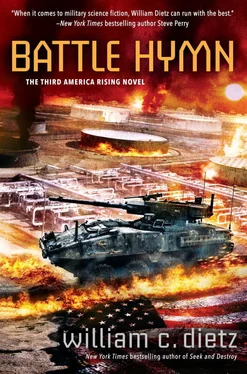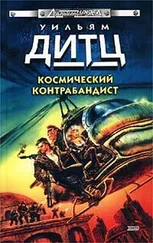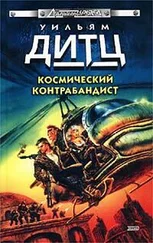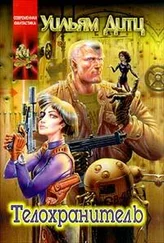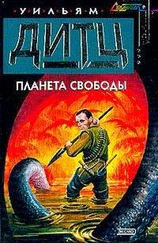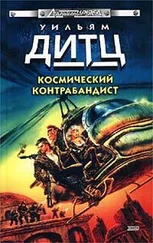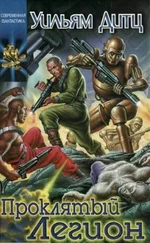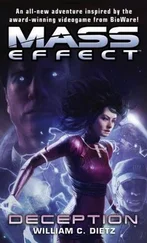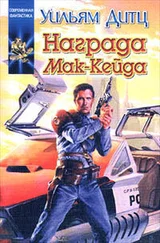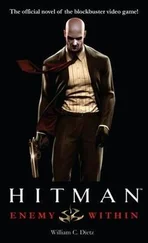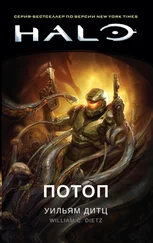“You’re amazing,” Mac said. “So tell me… What do I want now?”
“A mug of Starbucks. But you can’t have it.”
Mac laughed. “No, I can’t. Come on. We have a damage assessment to do.”
NEW ORLEANS, LOUISIANA
Sloan had spent four hours touring the city of New Orleans with the mayor, who, like most of his subordinates, had been installed by the New Confederacy. But rather than throw him out, Sloan was mindful of President Lyndon B. Johnson’s comment regarding FBI Director J. Edgar Hoover: “It’s probably better to have him inside the tent pissing out, than outside the tent pissing in.” And as far as Sloan could tell, the strategy was working. The mayor was happy to take credit for the supplies pouring in from the North and had moderated his public stance accordingly.
Now, as Sloan got off the freight elevator, a group of citizens was waiting to get on. The storm was over, and they were eager to assess the damage to their homes. At least some members of the group recognized Sloan, and one woman shouted, “We love you, Mr. President! Thank you!” Sloan paused to shake hands and wish the refugees well.
“You were right,” Secretary of Defense Garrison said, once the group was on the elevator. “Inviting people to stay down here was good PR.”
“It was also the right thing to do,” Sloan added. He knew the comment made him sound like a self-righteous jerk, but he didn’t want to run a government that was based on appearances. And if that meant coming across as a sanctimonious jerk, then that was a price he’d have to pay. “So what gives?” Sloan inquired. “I got your message and came back early. This isn’t bad news I hope.”
“No,” Garrison assured him. “It isn’t bad news. Come on… I want you to see this firsthand.”
Sloan followed Garrison into the Situation Room. At least a dozen people were assembled there, and most were smiling. “We have something for you, Mr. President,” Intelligence Director Kip told him.
Sloan’s eyebrows rose. “Which is?”
“General Ramos cut a deal… And we got a lot more than we expected to.”
“All right,” Sloan replied as he sat down. “Lay it on me.”
The lights dimmed, and video appeared on the main screen. It began with a picture of Ramos. His name and rank were visible below the photo. The time, date, and location of the interview could be seen as well.
Then Ramos appeared. His hair was nicely cut, his clothes were clean, and a bottle of water sat inches from his right hand. “Please state your name and rank,” a disembodied voice said.
“I am Major General Matias Ramos, Mexican Army,” Ramos said.
“Now,” the voice said. “Please tell us how the alliance between Mexico and the New Confederacy came into existence.”
Ramos shrugged. “I wasn’t present during the initial negotiations. But, according to what President Salazar told me, a deal was done.”
“What kind of a deal?” the voice wanted to know.
“The essence of the agreement was that the New Confederacy would provide Mexico with two tons of gold, plus the states of California, Nevada, Utah, and Arizona in return for our assistance in winning the war. And that’s what I call one helluva good deal.”
Kip pointed a remote at the screen and the video froze. “So?” she demanded. “What do you think?”
Sloan was stunned. Suddenly, the whole thing made sense. They’d been aware of the gold. One ton of it anyway… Which never seemed like enough money to buy four divisions of troops. Especially troops that had no aircraft to speak of and were underequipped.
But a huge chunk of land? Land that once belonged to Mexico? Yes. That kind of payment would make political sense. Salazar would be elected president for life. “It’s amazing,” Sloan said. “And a measure of just how desperate the Confederacy is.”
“That’s true,” Besom agreed. “Which is why we should make the video public.”
“I don’t know,” Sloan temporized. “Will people believe it?”
“Some won’t,” Besom admitted. “But lots of people will because it makes sense. Some of the rebs will accept the deal as a necessary evil, but others will be appalled, and the blowback could cost Stickley her job. A sudden change in leadership would be helpful right now. The timing is perfect.”
“Skeptics will claim that we made the whole thing up and forced Ramos to say it,” Sloan countered.
“Sure,” Kip agreed. “But what if we give Ramos some money and the freedom to move freely? He’s a playboy… And his activities will generate a lot of press coverage. That could go a long way toward countering the torture theory.”
“True,” Sloan conceded. “But the Mexicans would send assassins to kill him.”
“So?” Kip inquired. “Why do I care?”
There was a pause while Sloan gave the matter some thought. “Okay,” he said finally. “Release the video and Ramos. But keep him alive.”
Kip made a face. “Do we have to?”
“Yes,” Sloan said. “Because we’re different from the people we’re fighting.”
NEAR NEW IBERIA, LOUISIANA
The Mexicans were holding their positions in New Iberia, as were the Confederate troops, who had been rushed in to help block the Union advance. The result was something akin to a living hell. Dark clouds hung low. Flashes strobed them from below—and man-made thunder rolled across the land.
In trenches reminiscent of WWI, men and women from both sides sallied forth in often futile attempts to claim a few additional yards of mud, their progress marked by the waves of bodies left behind. Engines roared as tanks rolled in to support the infantry.
But the mechanical monsters were met with a hail of AT4 rockets, or targeted by the 155mm howitzers located twenty miles behind enemy lines, and reduced to piles of burning scrap. Soon thereafter, Predator drones would prey on the 155s, or ground-to-ground missiles would seek the batteries out, leaving another crater to mark where they had been. That’s when more weapons would be brought forward, and the cycle would begin again.
That was the horror to which Mac and the convoy called Road-Runner-Three had to go in order to deliver the supplies they’d fought so hard to bring from New Orleans. The location Mac had been given was in the nonexistent town of Duboin. “Nonexistent” because she couldn’t see any sign that a town had ever existed there as the MRAP passed the wasteland of overlapping shell craters, muddy trenches, and sandbagged bunkers that Union soldiers called “Camp Fuckme.”
And Mac could tell that at least some of the complex was within range of the enemy’s artillery because 155mm rounds were falling a quarter mile to the north. Each shell produced an audible thump followed by a geyser of mud. Was the attack producing a meaningful impact? It was impossible to tell. But there was reason to worry because once the enemy drones spotted the convoy, the rebel field artillery would almost certainly shift its fire to them.
But the way was clear, and the ground equivalent of a JTAC was riding Green hard. “Hurry up, Road-Runner-Three… Let’s get those rigs down and out of sight. Over.”
MPs waved them toward a well-graveled ramp that led down into a hastily excavated subsurface supply depot. All sorts of directional signs could be seen, some of which were in Spanish.
The MRAP came to a stop, and as Mac jumped down onto the ground, a lieutenant colonel came forward to meet her. He had blue eyes, thinning hair, and the manner of the college professor that he normally was. “Hello, I’m Colonel Breeson. I believe you already know my number two, Captain Wu.”
“I do,” Mac said as she gave Wu a hug. “She’s the best supply officer I ever had.”
Читать дальше
